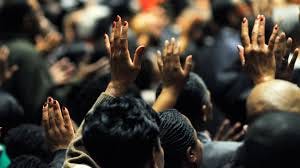Earlier this week, the New York Times got around to noticing one of the most important social and political developments of our time: the decline of the black church. This is a matter of real concern in African American life, and the political health of the nation as a whole.
The main problem in mainline Protestant African American churches, as in the nation’s churches as a whole, has been the sharp and accelerating disinclination of younger people to participate in religious services. This tendency reflects the increasing emphasis on personal choice in American life (from the composition of one’s soft drink to one’s reproductive rights) and the concerns young people have had about the practices and policies of organized religion (whether clerical abuse in the Catholic church or stances toward LGBTQ rights in black churches, which tend to be more conservative than younger African Americans as a whole). These are not matters that lend themselves to easy fixes.
This is a problem more broadly because the black church has been the institutional foundation for social reform in this country for well over 200 years. The two greatest movements in American history—abolition and the Civil Rights movement—would have been impossible without the leadership, logistics, and moral fervor of the Baptist and African Methodist Episcopal churches in particular. As I routinely remind my students, it was the Reverend Martin Luther King, Jr. of the Dexter Avenue (Montgomery) and Ebenezer (Atlanta) Baptist Churches that served as the crucial base of his operations. It was as Minister Malcolm X that the fiery Muslim leader made his biggest impact. It’s also essential to note that in all these cases, it was women—whether well-known like Ella Baker or not—who provided the crucial sinews that made these organizations work and social reform possible.
The Times story notes correctly that not all black social movements were rooted in the churches. But the example cited—Black Power—is inadvertently revealing, not only because its roots (in the Student Non-Violent Coordinating Committee founded by Baker) are also inevitably located in the black church, but more importantly that it was the rise Black Power that marked the precise moment when the Civil Rights movement began its decline. This is a complex matter that can’t solely be blamed on Stokely Carmichael—and can be blamed on entrenched racism—but the fact remains that secularization did not really improve the outcome of the movement. Largely secular leaders in African American history, from Frederick Douglass to W.E.B. DuBois, were always careful to note and respect the role of faith in black life as a matter of survival, political and otherwise, and channeled biblical language and themes in their writings. One wonders if Black Lives Matter might have been more appealing and durable if it availed itself of such spiritual resources.
Again, the fact that BLM didn’t is reflective of broader tendencies in American society at large. Churches, along with unions, are what gave the Democratic party its political heft, and the waning of both surely has something to do with the small but steady drift of people of color, especially men, into the Republican Party. Two really notable new facts: for the first time ever, there are now more registered Republicans than there are Democrats among working-class whites—the single biggest trove of votes in the American electorate—and young men are more likely to identify as church members than women. These developments are two canaries in our political coal mines.
I don’t believe that any civilization can survive for any length of time without some strong collective commitment to the transcendent. It need not be uniform (in fact, it rarely is) and a healthy society will always allow for some degree of dissent and even allow space for the profane. But when non-belief becomes the prevailing common sense, pluralistic societies become vulnerable to vocal minorities with greater moral certitude, whether justified or not. This is not something we can reason our way out of. But it does lead one to hope, as has often happened in many societies—including this one—for a productive religious revival: the First Great Awakening, for example, which helped spark the Revolution; or the Second, which spawned a series of social reforms from suffrage to abolition. Perhaps we are due for a comparable renewal that can have positive secular consequences.




I was an altar boy, a choir boy, then a questioning Catholic, a lapsed Catholic, a collapsed Catholic. I read Summa Theologiae I.2.3, The Argument from Design, in college and realized the implausibility of the scientific Origin story (gasses colliding in the Universe and voila! orchids, monarch butterflies, the Alps, sunsets etc). I wish that every high school or university would require an exploration of the origins of life. AP Biology does not cover this, even in Catholic schools. Personally I think it must be exhausting to live without faith. Thanks again Jim, your essays speak to me in a way no other writer consistently does.